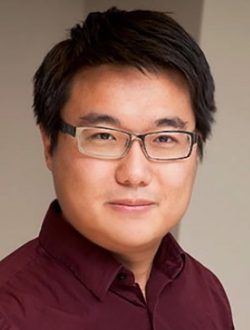IEEE Distinguished Microwave Lecture (DML) by Dr. Ruonan Han "CHIP-SCALE WAVE-MATTER INTERACTIONS AT RF-TO-LIGHT FREQUENCIES: CIRCUITS, SYSTEMS AND APPLICATIONS"
This talk is an IEEE Distinguished Microwave Lecture (DML)
Date and Time
Location
Hosts
Registration
-
 Add Event to Calendar
Add Event to Calendar
Loading virtual attendance info...
- Contact Event Host
-
Deukhyoun Heo Ph.D.Frank Brands Analog Distinguished ProfessorAnalog RF and Mixed-Signal Application GroupElectrical Engineering and Computer ScienceWashington State University, Pullman, WAhttp://armag.eecs.wsu.edu
Speakers
 MIT
MIT
CHIP-SCALE WAVE-MATTER INTERACTIONS AT RF-TO-LIGHT FREQUENCIES: CIRCUITS, SYSTEMS AND APPLICATIONS
Traditional electromagnetic (EM) spectral sensors using integrated circuit technologies (e.g. automotive radars, security imagers, cameras, etc.) are normally based on remote wave scattering or absorption by macroscopic objects at remote distance; the operations are also not selective in wave frequencies. In the past couple of years, a new paradigm of chip-scale EM spectral sensing emerges with features complementary to the above: they utilize various modalities of interactions between EM waves with high-precision frequency control and microscopic particles (molecules, atoms, etc.) with close proximity to the chip. This progress is enabled by the recent advances of silicon devices and processes, as well as the extension of circuit operation frequencies into the terahertz regime. Chip-scale sensing and metrology systems with new capabilities, higher performance and unprecedented affordability now become possible. Examples include THz gas spectroscopy sensors, on-chip “atomic-clock-grade” frequency references, room-temperature CMOS-quantum magnetometers, etc. This talk will present the basic physics of the some wave-matter interactions, key enabling technologies, as well as the designs and prototypes of a few chip systems in the category described above. We will also discuss their potential applications in bio- chemical analysis, wireless networks, PNT (positioning, navigation & timing), security and so on.
Biography:
Ruonan Han (S’10-M’14-S’19) received the B.Sc. degree in microelectronics from Fudan University, China , in 2007, the M.Sc. degree in electrical engineering from the University of Florida, Gainesville, FL, USA, in 2009, and the Ph.D. degree in electrical and computer engineering from Cornell University, Ithaca, NY, USA, in 2014. In 2012, he was an intern with Rambus Inc., Sunnyvale, CA. He is currently an associate professor with the Department of Electrical Engineering and Computer Science, Massachusetts Institute of Technology, Cambridge, MA, USA. His current research interests include microelectronic circuits and systems operating at millimeter-wave and terahertz frequencies. Dr. Han is a member of the IEEE Solid-State Circuits Society (SSC-S) and the IEEE Microwave Theory and Techniques Society (MTT-S). He was a recipient of the Cornell ECE Directors Ph.D. Thesis Research Award, Cornell ECE Innovation Award, and two Best Student Paper Awards of the IEEE Radio-Frequency Integrated Circuits Symposium (2012 and 2017). He was also recipient of the IEEE MTT-S Graduate Fellowship Award, and the IEEE SSC-S Predoctoral Achievement Award. He is an associate editor of IEEE Transactions on Very-Large-Scale Integration (VLSI) System and a guest associate editor of IEEE Transactions on Microwave Theory and Techniques. He also serves on the Technical Program Committee (TPC) of IEEE RFIC Symposium and the TPC and Steering Committee of 2019 IEEE International Microwave Symposium (IMS). He is the winner of the Intel Outstanding Researcher Award (2019) and the National Science Foundation (NSF) CAREER Award (2017).
Address:United States

